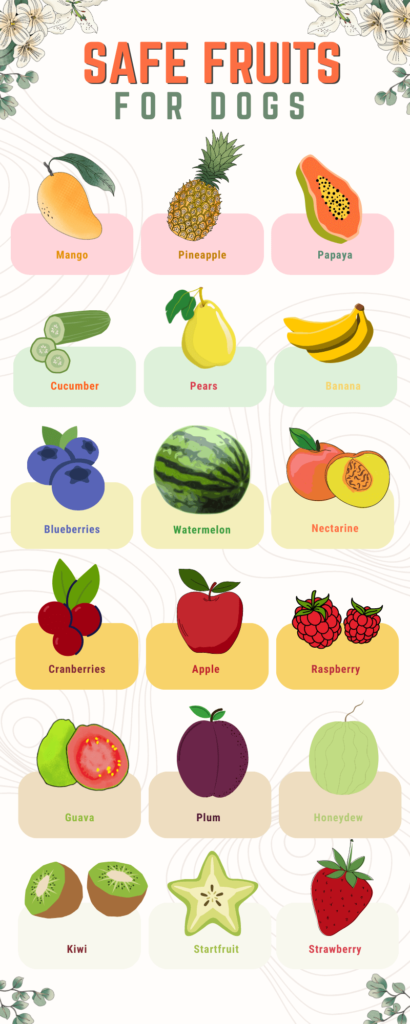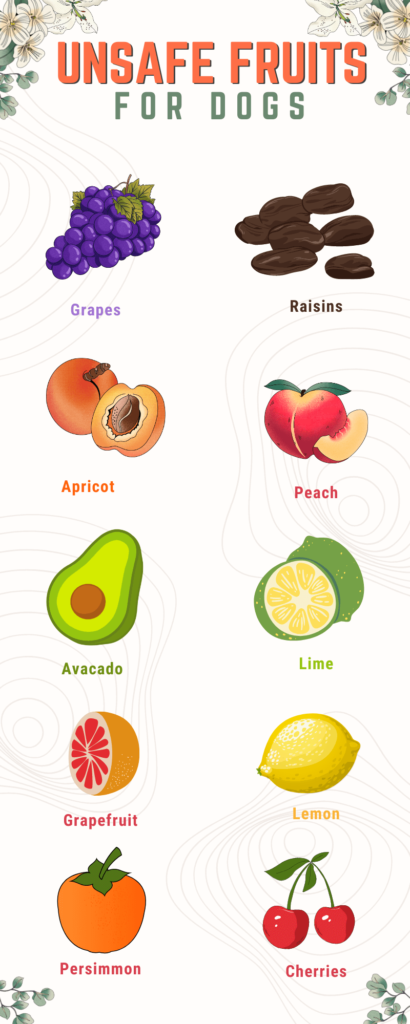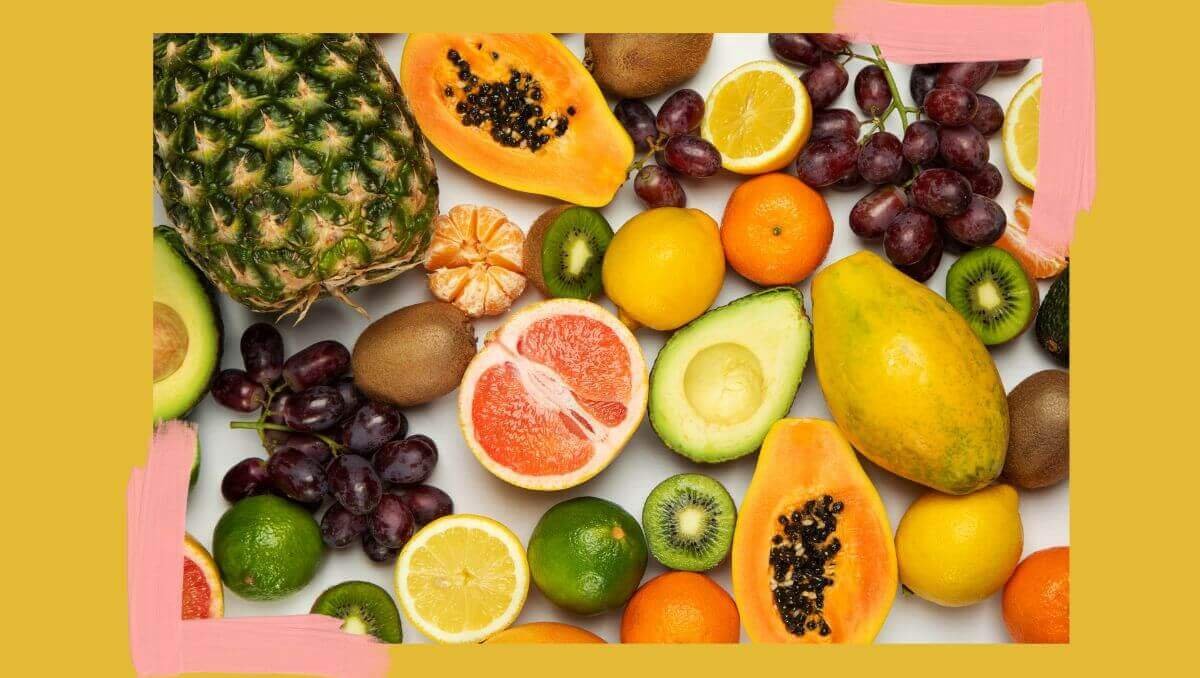As responsible pet owners, we want the best for our furry companions. One common question that arises is whether dogs can eat fruits. Providing a well-balanced diet is essential for their overall health and happiness. So, can dogs eat fruits?
In this article, we will explore the benefits and potential risks of feeding fruits to dogs, identify safe and dog-friendly fruits, learn how to introduce fruits into their diet and understand the importance of moderation.
Can Dogs Eat Fruits?
Yes, dogs can enjoy fruits. Fruits can indeed be a nutritious and enjoyable addition to a dog’s diet. They offer a variety of vitamins, minerals, and antioxidants that promote overall health and well-being. Many dogs relish the natural sweetness and textures of fruits, making them a delightful treat option.
However, it’s crucial to exercise caution and select dog-friendly fruits. Some fruits may contain harmful compounds or seeds that can pose choking hazards. Additionally, fruits high in natural sugars should be offered in moderation to prevent digestive issues or weight problems.
Benefits of Fruits for Dogs: A Nutritional Powerhouse
Fruits pack a punch of nutritional goodness for our furry companions, offering a wide range of benefits. Here are the reasons why fruits are a fantastic addition to a dog’s diet:
- Rich in Vitamins and Minerals: Fruits are abundant in essential vitamins and minerals that contribute to a dog’s overall health. Vitamin C, found in fruits like oranges and strawberries, supports a robust immune system, helping them stay strong and fend off illnesses.
- Potassium for Healthy Muscles and Heart: Potassium, present in fruits like bananas, is crucial for maintaining healthy muscles and promoting proper heart function in dogs. This mineral ensures their muscles stay strong and agile, supporting their active lifestyle.
- Antioxidants for Overall Well-being: Antioxidants, plentiful in fruits like blueberries, combat harmful free radicals in a dog’s body. By reducing oxidative stress, antioxidants help protect their cells and contribute to their overall well-being.
- Fiber for Digestive Health: Many fruits are rich in dietary fiber, promoting healthy digestion in dogs. Fiber aids in regulating bowel movements, preventing constipation, and keeping their gastrointestinal system in top shape.
- Hydration and Electrolytes: Fruits like watermelon, with their high water content and electrolytes, can help keep dogs hydrated, especially during hot weather or after physical activity.
- Tasty and Nutritious Treats: Fruits add a touch of natural sweetness to their meals, making them a delightful and nutritious treat option. These tasty rewards can enhance their mealtime experience and encourage good behavior during training sessions.
- Low in Calories: Many fruits are relatively low in calories, making them an excellent choice for dogs watching their weight. These guilt-free treats provide a burst of flavor without compromising their diet.
- Promoting Dental Health: Some fruits, like apples and carrots, have a crunchy texture that helps clean a dog’s teeth as they chew. Chewing on these fibrous treats can aid in reducing plaque and tartar buildup, contributing to better dental health.
When introducing fruits to your dog’s diet, opt for dog-friendly varieties, and remember to offer them in moderation. While fruits offer numerous health benefits, they should be a complement to a well-balanced diet, not a replacement for it. With an assortment of fruits to choose from, you can provide your furry friend with a rainbow of nutrients to support their vitality and happiness.
Popular Fruits and Their Benefits

When it comes to sharing fruits with our canine companions, some varieties stand out as favorites. Let’s explore the most popular fruits that dogs can safely enjoy and the specific benefits each fruit brings to their overall health and well-being. These tasty treats will surely add a touch of sweetness to your furry friend’s diet.
Apples
Apples are a fantastic fruit for dogs, offering a satisfying crunch that helps clean their teeth and freshen their breath. Rich in dietary fiber, they promote healthy digestion and can be particularly beneficial for dogs prone to gastrointestinal issues. Vitamin A in apples supports good vision and a robust immune system, ensuring your furry friend stays healthy and happy. To serve apples to your dog, remove the seeds and core, and offer small slices as an occasional treat, making sure to avoid excessive consumption due to their natural sugars.
Bananas
Bananas are a go-to fruit treat for dogs due to their natural sweetness and high potassium content. Potassium is essential for maintaining proper muscle function and heart health in dogs. Bananas are also rich in B-vitamins, including B6, which supports metabolic processes and aids in enzyme function. Dogs find bananas easily digestible, making them an ideal snack for pups with sensitive stomachs. Remember to offer bananas in moderation, as they are calorie-dense, and ensure they are ripe and well-peeled for easy chewing.
Blueberries
Blueberries are a nutritional powerhouse for dogs, boasting a wealth of antioxidants that combat free radicals and promote cellular health. The low-calorie content of blueberries makes them an excellent choice for weight-conscious dogs. These tiny berries are also packed with vitamins C and K, supporting immune function and blood clotting. To serve blueberries to your dog, offer them whole or as a frozen treat on a hot day.
Watermelon
Watermelon is not only a refreshing treat for dogs but also an excellent source of hydration, especially during hot weather. This juicy fruit is loaded with vitamins A, B6, and C, which contribute to healthy skin, coat, and immune system. The high water content in watermelon helps keep your dog hydrated and supports proper kidney function. Remember to remove the seeds and rind before offering your furry friend a delightful taste of this summertime favorite.
Strawberries
Strawberries are a delightful treat for dogs, providing dietary fiber that aids digestion and helps regulate bowel movements. The abundance of vitamin C in strawberries supports immune function and promotes collagen production for healthy skin and joints. While strawberries are safe for dogs, it’s essential to offer them in moderation due to their natural sugar content. Remove the green stems and cut the berries into bite-sized pieces for easy consumption.
Oranges
Oranges are a good source of vitamin C, which contributes to a strong immune system and overall health in dogs. However, oranges should be considered an occasional treat due to their high acidity and natural sugars. Feeding small, peeled orange slices can be a tangy and delicious way to treat your dog. Always ensure that your pet doesn’t consume the seeds or the peel, as they can be difficult to digest and may cause gastrointestinal upset.
Pineapple
Pineapple contains an enzyme called bromelain, which aids in digestion and can be beneficial for dogs with certain gastrointestinal issues. However, bromelain can cause mouth irritation in some dogs, so it’s essential to feed pineapple in moderation and observe how your pet responds. Remove the tough skin and the central core before offering pineapple chunks as an occasional tropical delight.
Raspberries
Raspberries are a rich source of fiber and antioxidants, supporting digestive health and fighting against harmful free radicals. The natural sweetness of raspberries makes them a tasty and healthy treat for dogs. As with all fruits, offer raspberries in moderation due to their natural sugars. Raspberries are small and easy to chew, making them a delightful and nutritious addition to your dog’s snack repertoire.
Cranberries
Cranberries are well-known for their urinary health benefits, as they can help prevent urinary tract infections in dogs. These tart berries are rich in antioxidants and vitamin C, contributing to a robust immune system. While cranberries are safe for dogs, they can be quite tart, so it’s best to serve them in moderation and in a form that your dog enjoys, such as dried cranberries or a small amount of unsweetened cranberry juice.
Mangoes
Mangoes offer a tropical and delicious treat for dogs, containing vitamins A and E, which support healthy skin, coat, and vision. However, mangoes are also high in natural sugars, so they should be served in small amounts to avoid any digestive upset. Remove the pit and offer small, ripe slices as an occasional fruity indulgence for your furry friend.
Dragon Fruit
Dragon fruit, a visually striking tropical fruit, can also be a delightful treat for dogs. Packed with essential nutrients, including vitamins C, B, and minerals like iron and calcium, dragon fruit offers a refreshing and healthy option for your canine companion. Remove the seeds and skin, then serve small, ripe slices as an occasional fruity indulgence.
Dates
Dates, while sweet and chewy, can make a tasty occasional treat for dogs. Rich in fiber and natural sugars, they provide a quick energy boost. Remember, offer small pieces and remove the pits to ensure your furry friend’s safety and enjoyment.
Risks and Toxic Fruits

While sharing fruits with our beloved dogs is a delightful thought, certain fruits can be harmful to their health. Here are some fruits to avoid:
Grapes and Raisins
Grapes and raisins can lead to kidney failure in dogs, even in small amounts. Keep these fruits away from your furry friend’s reach at all times.
Onions and Garlic
While not fruits, onions and garlic are commonly found in some fruit-based dishes and can be toxic to dogs when consumed in large quantities. Be cautious of dishes that may contain these ingredients and ensure they are kept out of your pet’s diet.
Avocado
Avocado contains persin, which can be toxic to dogs and may cause vomiting, diarrhea, or even more severe reactions. Avoid giving your dog any part of the avocado.
Citrus Fruits
Citrus fruits like lemons, limes, and grapefruits contain essential oils and compounds that can cause gastrointestinal discomfort in dogs. The high acidity levels may lead to upset stomachs, so it’s best to keep these fruits away from your furry friend.
Cherries
Cherries, especially the pits and stems, contain cyanide, which is toxic to dogs. Ingesting cherry pits can lead to serious health issues, including difficulty breathing.
Peaches and Plums
The pits in peaches and plums contain cyanide, posing a choking hazard and potential toxicity risk to dogs. Only offer small, seedless portions of these fruits if you wish to share them as an occasional treat.
Apricots
Apricots also have pits that contain cyanide, making them unsafe for dogs. Stick to small, seedless portions if you want to share this fruit with your pet.
Persimmons
Persimmons can cause intestinal blockages in dogs, leading to severe discomfort and possible surgery. Keep these fruits out of your pet’s reach to avoid any issues.
Soursop
While Soursop is a delicious and exotic fruit for humans, it’s not recommended for dogs. Soursop contains annonacin, a compound that can be toxic to dogs and lead to neurological issues and digestive problems.
Pits and Seeds
In general, avoid giving your dog any fruits with pits or seeds, as they can pose a choking hazard or contain harmful compounds.
Elderberries
Elderberries, while popular for their health benefits in humans, pose risks to dogs due to potential toxicity. The seeds and stems of elderberries contain cyanide, presenting a choking hazard and health risks for pets.
Best Ways to Introduce Fruits to Dogs
Introducing new foods, including fruits, to your furry companion requires patience and care. Follow these steps to ensure a smooth and safe transition:
- Start Small: Offer small pieces of fruit to your dog to gauge their response. This approach allows you to observe any adverse reactions and adjust accordingly.
- Observe Reactions: Some dogs may readily enjoy fruits, while others might be hesitant. Watch how they react to the new flavors and textures.
- Encourage Acceptance: Mix fruits with your dog’s regular food to familiarize them with the taste gradually. This can be an effective way to encourage acceptance.
- Thorough Preparation: Always wash the fruits thoroughly to remove any pesticides or residues. Peel the fruits and remove any seeds to minimize choking hazards.
Feeding Fruits to Dogs: Moderation, Precautions, and Warnings
Enjoying fruits can be a delightful experience for your furry companion, but it’s crucial to approach it with caution and care. Here are some essential points to consider:
- Moderation and Frequency: While fruits offer numerous health benefits, they should be given in moderation. Remember, fruits should not replace a balanced dog food diet. Too much fruit consumption can lead to digestive upset or weight issues due to their natural sugars. As a general rule, treats, including fruits, should constitute no more than 10% of a dog’s daily caloric intake.
- Choking Hazards: Always be mindful of choking hazards, such as pits and seeds in certain fruits. Before serving fruits to your dog, make sure to remove these potential hazards to ensure safe consumption.
- Monitor for Adverse Reactions: Every dog is unique, and their reactions to new foods can vary. When introducing fruits, observe your pet for any adverse reactions, including gastrointestinal issues or allergic responses. If you notice any negative effects, discontinue feeding the fruit immediately.
- Consult Your Veterinarian: If you have any doubts or concerns about feeding specific fruits to your dog, it’s best to consult your veterinarian. They can provide personalized advice based on your dog’s individual health needs and dietary requirements.
Remember that each dog’s diet should be tailored to their age, size, breed, and health condition. By approaching fruit consumption with mindfulness and adhering to these precautions, you can ensure a safe and enjoyable fruity experience for your beloved canine companion.
Just like humans, dogs can have allergies too. If your dog exhibits symptoms such as itching, hives, or gastrointestinal distress after consuming a specific fruit, they might be allergic to it. In such cases, it’s essential to avoid that fruit and seek advice from a veterinarian for appropriate allergy management.
Alternative Treats for Dogs: A World of Healthy Options
When it comes to treating our canine companions, the choices are abundant beyond just fruits. Here are some fantastic alternatives to explore, providing a delightful variety for your furry friend:
Commercial Dog Treats
Commercial dog treats are specifically formulated to meet the dietary needs of dogs. They come in various flavors, textures, and sizes, catering to different breeds and preferences. Look for high-quality treats with natural ingredients and avoid those with excessive additives or fillers.
Homemade Treats:
Homemade treats offer a special touch of love and care. You can create delicious treats using dog-friendly ingredients like peanut butter, pumpkin, sweet potatoes, and carrots. Experiment with different recipes and find the ones that your dog loves the most.
Vegetables
Vegetables can be a nutritious and low-calorie treat for dogs. Carrots are a popular choice, providing essential vitamins and promoting dental health. Green beans and broccoli are also excellent options, offering fiber and antioxidants.
Grains
Cooked grains like brown rice, quinoa, and oats can be a healthy treat option for dogs. These grains provide valuable nutrients and can be combined with other ingredients to create tasty and filling treats.
Nuts
While many nuts are not safe for dogs, some can be a healthy indulgence in small amounts. Plain, unsalted peanuts and cashews can be suitable options, but always check for any allergies or sensitivities first.
Meat-based Treats
Dogs naturally love the taste of meat, making meat-based treats a favorite choice. You can find a variety of meaty treats, such as jerky or freeze-dried options, that are rich in protein and low in additives.
Seafoods
Seafoods can offer essential nutrients and proteins for dogs. Salmon, rich in omega-3 fatty acids, supports heart health and contributes to a shiny coat. Tuna, another protein source, provides necessary vitamins, but excessive consumption can lead to mercury exposure, so offer it in moderation
Freeze-Dried Fruits and Vegetables
If you want to offer the flavors of fruits and vegetables without the mess, freeze-dried options are a great choice. These treats retain most of the nutrients and flavors, providing a convenient and nutritious snack.
Dental Chews
Dental chews not only serve as a tasty treat but also help keep your dog’s teeth clean and breath fresh. Look for dental chews designed to reduce plaque and tartar buildup.
Cheese and Yogurt
Some dogs enjoy cheese and plain, unsweetened yogurt as a special treat. These dairy products can be rich in protein and calcium, but be mindful of lactose intolerance in some dogs.
Ice Cream and Frozen Treats
During warm weather, treat your dog to some dog-friendly ice cream or frozen treats. Many pet stores offer frozen delights made specifically for dogs, providing a refreshing and enjoyable experience.
Remember that treats, regardless of their type, should be offered in moderation to avoid excessive caloric intake. Variety is the spice of life, so feel free to rotate between different treats to keep your dog excited and satisfied.
Alternatively, here are other foods and fruits including the some miscellaneous foods that you can safely give to your dogs.
Conclusion
In conclusion, dogs can safely enjoy a variety of fruits as part of their balanced diet. The key is to choose dog-friendly fruits, offer them in moderation, and observe your pet for any adverse reactions. Fruits can be a delightful and nutritious treat for our furry friends, adding some excitement to their meals and providing valuable vitamins and minerals.
As with any new treat, introduce them gradually to ensure they are well-tolerated by your furry friend. Remember to prioritize your dog’s well-being and provide a diet that meets their specific needs, including the occasional fruit indulgence to brighten their day.
Frequently Asked Questions
Can Dogs Eat Fruits Everyday?
Dogs can enjoy fruits daily in moderation, offering valuable nutrients and antioxidants. Variety is key to a balanced diet, but moderation prevents digestive issues.
Can Dogs Eat Fruits and Vegetables?
Yes, dogs can safely consume a range of fruits and vegetables. These provide essential nutrients and fiber, supporting overall health when introduced gradually.
Are Dogs Allowed Any Fruit?
Certain fruits like apples, blueberries, and bananas are safe for dogs, but seeds and pits must be removed. Gradual introduction helps prevent any potential digestive discomfort.
